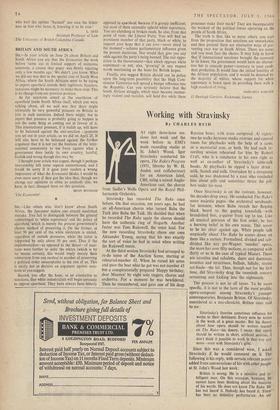BRITAIN AND SOUTH AFRICA
SIR,—In your article on June 26 about Britain and South Africa you say that the Economist the week before 'came out in limited support of economic sanctions, a course that paper was firmly rejecting only a few months ago.' We didn't, you know. What we did say was that in the special case of South West Africa, where the South Africans seem to be trying to export apartheid Outside their legitimate frontiers, sanctions might be necessary to make them stop. This is no change from our previous position.
As for sanctions aimed at the overthrow of apartheid inside South Africa itself, which you were talking about, all we said was that there might ultimately be very powerful pressure on Britain to join in such sanctions. Indeed there might; but to report that pressure is probably going to happen is not the same thing as coming out in favour of it. This international pressure, if it builds up, will have to be balanced against the anti-sanction 1.rguments you set out in your article, as we did on April 25. It will also have to be balanced against the further argument that it is not yet the business of the inter- national community to use force against what a government does inside its own country, hateful, foolish and wrong though that may be.
I thought your article was cogent, though it perhaps unavoidably left some aspects unmentioned, and I would be sorry if it gave your readers a wrong impression of what the Economist thinks. I would be even more sorry if they got the idea that, though we change or opinions as often as anybody else, we have, in fact, changed them on this question.
'The Economist'
BRIAN BEEDHAM






























 Previous page
Previous page